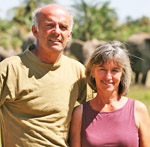This is a tale of two lives. The first, an elephant’s life in the United States, as a traveling Ringling Brothers entertainer. The second, an elephant’s life in Africa, an integral member of a roaming, socially structured herd.
According to elephant expert Dr. Joyce Poole, on an average day, elephants travel between 5 and 9 miles, in the wild.
According to trainweb.org, a Ringling Brothers elephant travels more than 16,000 miles each year, inside a train car.
Which is the Greatest Show on Earth? You decide:
«« »»
EarthDesk is grateful to Petter Granli and Joyce Poole, co-directors of ElephantVoices, for allowing us to include “Elephant Play Behavior,” the second video above, narrated by Dr. Poole.
ElephantVoices uses knowledge acquired over decades to act as a voice for elephants. In the wild, ivory poaching, destruction of habitat, competition with people for diminishing resources, sport hunting, culling and capture all threaten the freedom and survival of elephants. In captivity their well being is affected by abusive practices and exploitation for commercial gain.
Through research, education, conservation and advocacy ElephantVoices promotes the protection and kinder treatment of elephants wherever they may be. As acknowledged experts on the natural behavior of elephants ElephantVoices offers insight to protect them and the authority to speak on their behalf.
More on ElephantVoices here.
More on Dr. Joyce Poole and Petter Granli here.
A National Geographic article on Poole and Granli’s work here.











Dziękuję za takich wspanialych i szlachetnych ludzi jak Wy. Oby bylo ich jak najwiecej 🙂
[Polish to English translation: Thank you for being such noble people. I wish there were more.]
This brought tears to my eyes as well. Who finds elephants with headdresses entertaining, no less watching them leave a train like circus clowns from a car? Can Ringling make money no other way?
both videos brought tears to my eyes. The first video, tears of sadness. The 2nd video, tears of joy.
I’ve experienced elephants in both environments. Circus and Kenya. The circus MANY years ago when I was a child, left me with an uneasy feeling but as young as I was I didn’t know why. I went to a circus once after that as an adult and got the same uneasy feeling, but this time I knew why. That was about 40 years ago and I have not been to a circus since! Fourteen years ago I visited Kenya and saw the elephants in the wild. Such a warm feel-good experience to see the elephants roaming free hasn’t been matched to this date. It is so heartbreaking to hear of all the illegal poaching of elephants and rhinos in Africa that I’m afraid these magnificent creatures soon will only exist in zoos and circuses and the few elephant sanctuaries here in the US.
I really know nothing about your organization, but thanks for posting these videos.
Hi Ann, Thank you for your heartfelt comment. We are pleased to hear from someone who had your firsthand experiences. EarthDesk is the environmental blog of Pace University, and animal welfare is one of our ares of special interest, along with water and climate. Do stay in touch. It is an inspiration to us to hear from you. John Cronin, Managing Editor